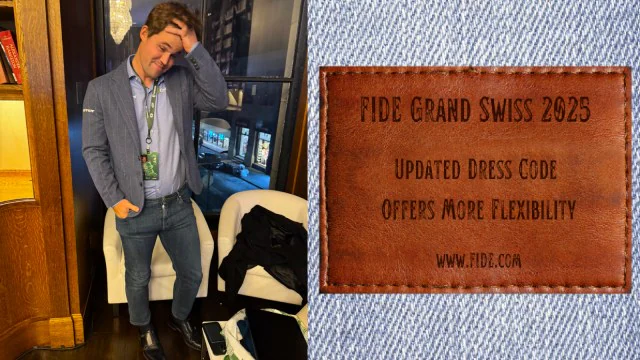Magnus Carlsen’s Influence on Chess: FIDE Eases Dress Code to Allow Jeans at Grand Swiss Tournament

Image via The Indian Express
In a landmark decision that will reshape professional chess attire, the International Chess Federation (FIDE) has announced a significant update to its dress code for the prestigious Grand Swiss and Women’s Grand Swiss tournaments. Starting from September, players will now be allowed to wear “appropriate jeans” during the events. This groundbreaking change, often referred to as the “Magnus Carlsen effect,” comes after a highly publicized controversy involving the world’s best chess player, Magnus Carlsen, and his refusal to adhere to traditional dress codes at the 2024 World Rapid Chess Championship.
The Spark Behind the Change
The recent change in policy stems from an incident that took place at the World Rapid Chess Championship in December 2024 in New York. Magnus Carlsen, the Norwegian grandmaster who is widely regarded as one of the greatest chess players of all time, was disqualified from the tournament for wearing jeans, which violated the event’s strict dress code. Despite being fined $200 and offered the opportunity to change into acceptable attire, Carlsen chose to withdraw from the tournament, citing the dress code issue as a matter of principle.
This bold move from Carlsen, who is known for his impeccable strategic mind, stirred intense debate within the chess community and beyond. His refusal to comply with the rigid dress code highlighted a clash between traditional norms in professional chess and the evolving, more relaxed dress standards in other professional arenas. The controversy soon gained widespread attention and placed the issue of dress codes in professional chess under the microscope.
FIDE’s Response: A Shift Towards Modernization
In response to the backlash surrounding the incident, FIDE has made an official announcement that will allow players to wear “appropriate jeans” during the upcoming Grand Swiss and Women’s Grand Swiss tournaments in Samarkand, Uzbekistan, which are set to take place from September 3 to 16, 2025. FIDE emphasized that while the new policy allows for more flexibility, players are still expected to maintain a professional and respectful appearance.
FIDE President Arkady Dvorkovich expressed that the updated dress code aims to balance comfort and professionalism. He stated, “It is still required to follow official standards, but we now acknowledge that ‘appropriate jeans’ are acceptable. The comfort of players is important, but so is preserving the dignity of the sport.”
This dress code revision marks a notable departure from the past, where traditional attire, including suits and ties, was strictly enforced during high-profile chess tournaments. By relaxing the rules, FIDE is aligning chess with other modern sports and professions that have adapted to more casual, yet still respectful, dress codes.
The Magnus Carlsen Effect
The change in FIDE’s dress code policy has been widely attributed to the “Magnus Carlsen effect,” referring to the influence Carlsen’s actions have had on the chess world. His defiance against the dress code drew attention to the outdated nature of certain traditional rules in chess, leading to increased calls for modernization.
Carlsen himself has not publicly stated that he requested the dress code change, but his stand has undoubtedly sparked a conversation about what is appropriate attire for modern chess. His decision to withdraw from the 2024 World Rapid Chess Championship, despite the consequences, signaled to FIDE and the chess community that a new approach was necessary. Although Carlsen is not expected to compete in the upcoming Grand Swiss events, his actions have set a precedent that will influence the future of professional chess attire.
Reactions from the Chess Community
The change to the dress code has received mixed reactions from players, commentators, and chess fans alike. Some believe that the revision is a long-overdue step towards making chess more inclusive and accessible to a wider range of players. As chess evolves, so too must its rules and regulations, they argue.
Others, however, express concern that the relaxation of dress codes could undermine the professional image of the sport. Some critics argue that traditional attire is an essential part of maintaining chess’s esteemed reputation, and loosening the dress code could lead to further changes in the future that might compromise the sport’s seriousness.
Indian Grandmaster Divya Deshmukh recently commented on the situation, noting that the controversy around Carlsen’s jeans has sparked ongoing discussions within the chess community. Deshmukh humorously referenced the situation in a recent interview, highlighting the fact that many players are torn between upholding tradition and embracing modernity. The conversation surrounding the dress code has also brought attention to the broader question of what should be deemed “appropriate” in terms of player attire.
A New Chapter for Chess
Looking forward to the Grand Swiss and Women’s Grand Swiss tournaments, which will feature top-tier players from around the world, all eyes will be on how the new dress code is implemented. As more high-profile tournaments are played with this updated dress policy, the question of attire will likely continue to evolve.
While the relaxed dress code might not have a direct impact on the game itself, it represents a broader cultural shift in chess. By updating its regulations to accommodate more flexible attire, FIDE is embracing the need for modernization without compromising the professionalism that the sport has long been known for. The move also underscores the increasing influence of players like Carlsen, who are shaping the future of chess both on and off the board.
As the Grand Swiss tournament approaches, the chess world will be keen to see how players and officials respond to the new dress standards. It remains to be seen whether this change will set the stage for even more significant shifts in the chess world in the years to come. But one thing is clear: Magnus Carlsen’s stand against the traditional dress code has played a pivotal role in making the chess world more adaptable to the evolving needs of modern players.